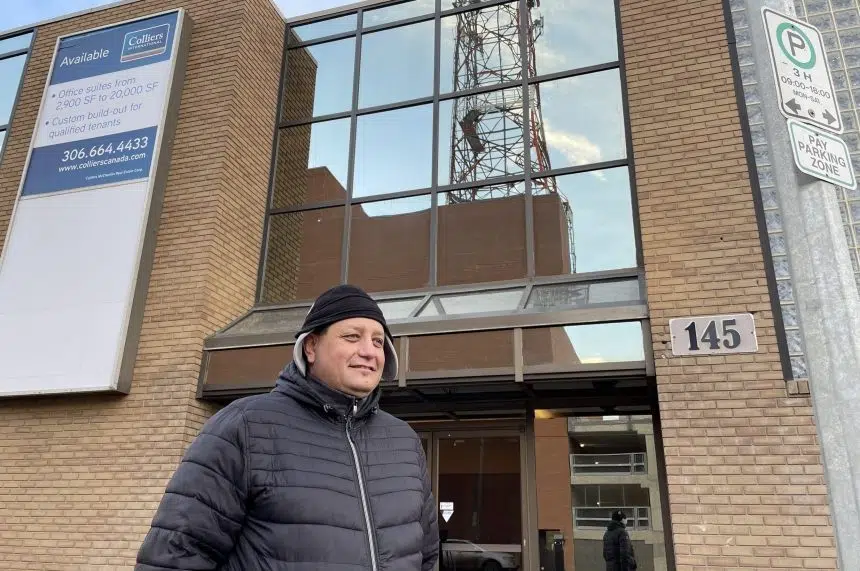Less than two months after opening, Saskatoon’s temporary emergency wellness centre is already bursting at the seams.
The shelter, located at 145 First Ave. N, opened Dec. 15 with a 50-person capacity, but Saskatoon Tribal Council (STC) Chief Mark Arcand said staff members are turning away people every night, sometimes up to a dozen at a time, due to high demand.
Turning people away is what the STC-run facility was trying to avoid.
“I don’t care who walks through our door. I need our people to step up and help these people because they are there for a reason. That’s how we’ve changed the system,” Arcand said, referring to the red tape at other government-funded shelters.
“We’ve all got to change the system together as a community. We all have to advocate for what’s best for our people.”
Arcand’s comments were made during a presentation to the Saskatoon Chamber of Commerce on Jan. 26. He provided the business group with a look at the shelter’s operations, but also a behind-the-scenes look at who is coming to the shelter looking for help.
In the first 39 days of operation, the facility saw 366 intakes or the equivalent of more than 2,100 beds.
Over half the guests have severe addictions to drugs and alcohol, a group whom Arcand believes are beyond rehabilitation and will require around-the-clock care to have any sort of quality of life.
He said about 15 people are on the “tipping point” but can get healthy with the right supports in place. There is also a small group of people who are just homeless without any underlying issues and just require a place to stay and food.
Sad reality
Arcand provided a glimpse of what staff at the facility encounter every day.
He himself was shaken up when he witnessed a person overdosing in the facility, an incident he says shows the sad reality of the addiction crisis in our community.
“I’m a pretty tough guy and this really freaked me out to see someone who overdosed with a needle sticking out of their belly and having our staff trying to bring them back,” Arcand said. “We didn’t give up their bed. We talked to them and that individual has not overdosed in our facility since that time.”
It’s not only people with addictions who need support. Arcand says all kinds of people are falling through the cracks.
The wellness centre took in two pregnant women with COVID-19. Arcand said they were sleeping on the street after they were turned away everywhere else. He also told the business group about an Indigenous man who came to the shelter over the Christmas break wearing only a T-shirt in -40 C weather.
“It was freezing cold outside. No jacket, no nothing. Walking around downtown like that. This is how bad we see what’s going on in our city and how we have to change the paradigm shift,” he said.
“People are saying, ‘Oh, it’s a government responsibility.’ Maybe it is. Some people will agree, some people will disagree. I think it’s a community responsibility.”
Helping homeless
Since the shelter opened, Arcand has been educating the public about the facility in an attempt to shed the stigma of it just being homeless shelter.
Health, counselling, and child and family services are on hand. Arcand said staff also work to find people employment outside or inside the facility.
“People really don’t believe we at STC hired a homeless guy,” Arcand said. “He’s our maintenance guy. He doesn’t drink, he doesn’t do drugs, he’s just homeless.
“He comes from a First Nation. His house burnt down in his community. That individual is 60 years old and he’s washing the floors (and) taking out the garbage, he’s washing down all the touchpoints and (he’s) outside shovelling the snow and washing all the windows.”
Expansion
On Feb. 1, the STC was granted approval by city council to add an extra 20 beds to offer a separate space for families with young children.
“The reason why we want to do that is to keep them away from the negativity that we see. We don’t want anybody that’s healthy be triggered or even expose children to this whether it be alcohol or drug use,” Arcand told councillors.
There’s no timeline when the new beds will be available.
Funding
Arcand said right now the facility is funded until the end of April.
Roughly $200,000 per month goes toward payroll and food costs.
The facility is funded federally and provincially along with an in-kind donation of $127,000 from the City of Saskatoon for the use of the building. The STC is providing $250,000 cash and in-kind programs with private donations totalling $157,000.
“This has really helped us in showing governments that even our citizens of Saskatoon are contributing to the success of what we’re trying to accomplish,” said Arcand, who added it feels good to be making a difference.











